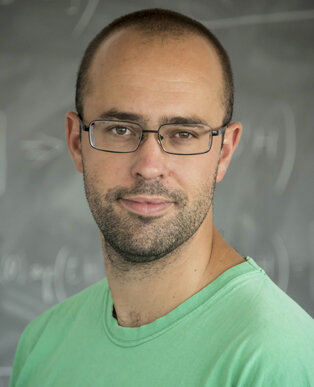Jose M. Conde Alonso
Assistant Professor - Universidad Autónoma de Madrid
2019-today: Assistant Professor, Universidad Autónoma de Madrid
Postdoctoral position, Universitat Autònoma de Barcelona
2011-2015: PhD. in Mathematics, Universidad Autónoma de Madrid
2015-2017: Postdoctoral position, Universitat Autònoma de Barcelona
2011-2015: PhD. in Mathematics, Universidad Autónoma de Madrid
How would you define your field of study? What is your vision about it? Which are the topics you're most passionate about?
My field of study lies somewhere between Harmonic Analysis and Operator Algebras. The connection between these two areas that I am interested in is the one whose starting point is the process of (mathematical) quantization: Heisenberg was the first to observe that one can deduce quantum phenomena from Newton's equations if one replaces the classical time-dependent variables by infinite matrices.
The rigorous mathematical formalization of this notion, started by von Neumann, gave rise to the study of algebras which constitute a noncommutative model for measure theory. Significant portions of my research so far have involved noncommutative generalizations of results in Classical Harmonic Analysis. Said generalizations have found applications to Free/Quantum Probability, Geometric Group Theory or Noncommutative Geometry. I consider myself more of a classical analyst and I am therefore especially interested in the measure-theoretic and analytic aspects of the process of quantization.
How do you expect your experience in IMM to be? Why did you accept to teach for this project?
I hope that my experience at IMM will be as beneficial as (I hope) will be for students. I expect to learn a lot from a cohort of highly
motivated students and I think the intensive format of the courses will make them more interesting from the point of view of human interaction. I accepted to teach for this project because I believe that talent, and mathematical talent specifically, is evenly distributed across countries. Therefore, it makes sense to collaborate in advanced programs anywhere I get the chance and especially where one can make an impact helping to establish a high level Master program where there was not one before. Also, I love traveling, and visiting a new country is always a plus for me personally.
What is your teaching philosophy? What would you like to transmit to your students? How do you motivate them?
My teaching philosophy is as Socratic as one can make it in
Mathematics. I love to teach through conversation, questions and answers, through which I hope to give them a sense of how much I love what I do and how wonderful advanced Mathematics are. Motivation is something I assume from my students, and I just hope to contribute in that after the course students will be more curious, eager to keep learning on their own.
Selected Publications
(with A. Barron, Y. Ou and G. Rey). Sparse domination and the strong maximal function. Adv. Math 345 (2019), 1-26.
(with M. Mourgoglou and X. Tolsa). Failure of L2 boundedness of gradients of single layer potentials for measures with zero low density. Math. Ann. 373 (2019), no. 1-2, 253-285.
(with J. Parcet and É. Ricard). On spectral gaps of Markov maps. Israel J. Math 226 (2018), no. 1, 189-203.
(with L. D. López-Sánchez). Semicommutative dyadic harmonic analysis beyond doubling measures. Proc. Amer. Math. Soc. 144 (2016), no. 9, 3869–3885.
(with G. Rey). A pointwise estimate for positive dyadic shifts and some applications. Math. Ann. 365 (2016), no. 3, 1111–1135.
Appointments and Awards
2019-today: Member, Instituto de Ciencias Matemáticas (ICMAT)
2016: Prize Vicent Caselles for mathematicians under 30 years of age, Spanish Royal Mathematical Society


